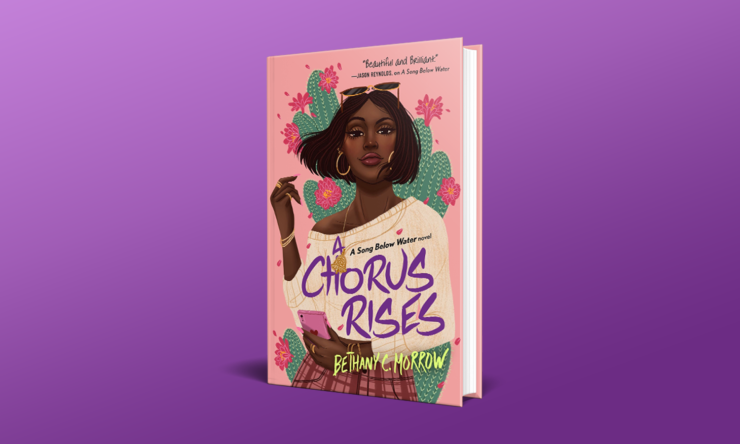Naema Bradshaw is not an easy character to sit with. As one of the antagonists in A Song Below Water, Tavia saw her as a popular girl who taunted her and her best friend Effie. Bethany C. Morrow recontextualizes Naema’s behavior in A Chorus Rises, revealing that there’s more to the Eloko than just being a Mean Girl. Naema wants to be liked, but she isn’t interested in being likeable. She is unquestionably and unapologetically herself.
A year has passed since the events of the first book. Despite Tavia and Effie’s efforts, no one event could undo four centuries of systemic oppression. Sirens may be the hot new mythological being, but the powers that be are as determined as ever to silence them at all costs. While Effie is off learning how to deal with her gorgon powers, Tavia remains in Portland, trying to balance her newfound fame into something impactful and make the tragedy into something that can change the world for the better.
But this isn’t Tavia or Effie’s story. No, A Chorus Rises is all about Naema, the Black Eloko who bickered with the sisters all through the first book and who Tavia siren-ed Effie into turning into stone. Elokos are known for being charming to the max, but no matter how much Naema tries to shine, she cannot escape the shadow of the previous year. Since exposing Tavia and Effie to the world and being Stoned and Awakened live on camera, Naema’s popularity has taken a nosedive. Everybody and their mother has Thoughts and Feelings about what Naema did and how she should behave in the aftermath, but no one has bothered to find out how she feels about everything.
Reeling from perceived betrayals from her friends and immediate family, Naema decides to take a break from everything. She heads to the Southwest to visit her extended relations for the first time ever. Away from the hustle of the big city, she finds a forgotten Eloko power, that of being connected to her ancestors. With their guidance and knowledge, Naema channels her pain and power as an Eloko, Mean Girl, and the living embodiment of Black Girl Magic into a force for change. She has more in common with Tavia than either girl would care to admit.
It is tempting to reduce Naema’s story into a redemption arc, but I think that misses the point of the novel. That and it positions her as the villain of A Song Below Water. There really isn’t anything Naema needs to be redeemed from. Naema is no villain; she’s a teenage girl who made mistakes and refuses to let those mistakes define her. What went down between her, Tavia, and Effie was a high school squabble that was turned into something meta by others. The true villain is a society that is willing to smother and silence Black girls simply for existing. Naema behaved badly, sure, but when compared to an oppressive system whose main attributes are brutality and threats, her actions pale in comparison.
That’s not to say she lacks character development, but growth doesn’t mean becoming a different person. Getting out of Portland allows Naema to see the world and her place in it in a new light. And she learns how to use her privilege to protect those who are powerless and to punish those who use their power to hurt. She also comes to see how her actions in the first book caused Tavia and Effie harm. However, when you put her and Tavia’s stories together, it’s clear that both of them did awful things to each other and that their actions had bigger consequences than either were prepared for.
Naema fully understands that intent doesn’t equal or negate impact. She gets how her video ended up being bigger than a girl trying to expose her nemesis. She owns and acknowledges that. But when outside (white) agitators latch onto her video and exploit it for their own gain, she refuses to take the blame. Her white “fans” center themselves in her pain, something she does not tolerate. She will not allow others to put words in her mouth or turn her into a mascot for their cause.
Buy the Book


A Chorus Rises
Throughout the novel, Naema’s confidence in herself never waivers, even as she confronts her bad behavior. I say “self-confidence” but many (white) people would probably label her as “arrogant” and “self-centered” instead. Black people, women especially, are often turned into villains by society simply for using their voice. Question authority and get saddled with the Angry Black Woman label. Call out microaggressions and get hauled into HR. Say no to something and get accused of being difficult to work with.
To press that point, in Morrow’s duology, sirens are almost exclusively Black women while Eloko are frequently white. Naema is in the uncomfortable position of having the privileges afforded to Eloko while being held to the same impossible rules as Black women. That she isn’t interested in giving up either identity, that she willingly and happily moves through the world as a Black Eloko, is something white people and white Eloko willfully ignore. To them, she’s Eloko as long as she behaves in a way they like. The minute she steps out of that box—a box she didn’t build or even wants to be in—she transforms into an uppity Black woman.
Morrow balances all this plus extended conversations on the prison industrial complex, class, social media, popularity, and more. That she can fill a novel with all these heavy conversations without weighing down the story is a testament to her talent. She took a character I had little interest in reading about and turned me into one of Naema’s strongest defenders.
A Chorus Rises is, like A Song Below Water, a book that begs to be discussed loudly and passionately. All I want to do is get together with a group of Black friends and talk about every single paragraph, to parse the metaphors and truths, to relate the girls’ experiences to our own. Bethany C. Morrow is one of the fiercest voices in young adult fantasy today, and I count myself honored to have this duology on my shelf.
A Chorus Rises is available from Tor Teen.
Alex Brown is a librarian by day, historian by night, author and writer by passion, and a queer Black person all the time. Keep up with them on Twitter, Instagram, and their blog.










